- Home
- Christopher Paolini
Inheritance i-4 Page 7
Inheritance i-4 Read online
Page 7
“We need the Urgals’ support,” said Nasuada. “We have too few warriors as it is.”
“We do not need them as badly as all that. You already know what I say is the truth; why else did you prevent the Urgals from participating in the attack on Belatona? Why else have you ordered them not to enter the city? Keeping them away from the battlefield isn’t enough, Nasuada. Word of them still spreads throughout the land. The only thing you can do to improve the situation is to end this ill-fated scheme before it causes us more harm.”
“I cannot.”
Orrin spun toward her, anger distorting his face. “Men are dying because you chose to accept Garzhvog’s help. My men, your men, those in the Empire … dead and buried. This alliance isn’t worth their sacrifice, and for the life of me, I cannot fathom why you continue to defend it.”
She could not hold his gaze; it reminded her too strongly of the guilt and recrimination that so often afflicted her when she was trying to fall asleep. Instead, she fixed her eyes on the smoke rising from a tower by the edge of the city. Speaking slowly, she said, “I defend it because I hope that preserving our union with the Urgals will save more lives than it will cost.… If we should defeat Galbatorix-”
Orrin uttered an exclamation of disbelief.
“It is by no means certain,” she said, “I know. But we must plan for the possibility. If we should defeat him, then it will fall to us to help our race recover from this conflict and build a strong new country out of the ashes of the Empire. And part of that process will be ensuring that, after a hundred years of strife, we finally have peace. I will not overthrow Galbatorix only to have the Urgals attack us when we are at our weakest.”
“They might anyway. They always have before.”
“Well, what else can we do?” she said, annoyed. “We have to try to tame them. The closer we bind them to our cause, the less likely they will be to turn on us.”
“I’ll tell you what to do,” he growled. “Banish them. Break your pact with Nar Garzhvog and send him and his rams away. If we win this war, then we can negotiate a new treaty with them, and we will be in a position to dictate whatever terms we want. Or better yet, send Eragon and Saphira into the Spine with a battalion of men to wipe them out once and for all, as the Riders should have done centuries ago.”
Nasuada looked at him with disbelief. “If I ended our pact with the Urgals, they would likely be so angry, they would attack us forthwith, and we cannot fight both them and the Empire at the same time. To invite that upon ourselves would be the height of folly. If, in their wisdom, the elves, the dragons, and the Riders all decided to tolerate the existence of the Urgals-even though they could have destroyed them easily enough-then we ought to follow their example. They knew it would be wrong to kill all the Urgals, and so should you.”
“Their wisdom-Bah! As if their wisdom has done them any good! Fine, leave some of the Urgals alive, but kill enough of them that they won’t dare leave their haunts for a hundred years or more!”
The obvious pain in his voice and in the strained lines of his face puzzled Nasuada. She examined him with greater intensity, trying to determine the reason for his vehemence. After a few moments, an explanation presented itself that, upon reflection, seemed self-evident.
“Whom did you lose?” she asked.
Orrin balled up a fist and slowly, haltingly, brought it down upon the windowsill, as if he wanted to pound it with all his strength but did not dare. He thumped the sill twice more, then said, “A friend I grew up with in Borromeo Castle. I don’t think you ever met him. He was one of the lieutenants in my cavalry.”
“How did he die?”
“As you might expect. We had just arrived at the stables by the west gate and were securing them for our own use when one of the grooms ran out of a stall and stabbed him right through with a pitchfork. When we cornered the groom, he kept screaming stuff and nonsense about the Urgals and how he would never surrender.… It wouldn’t have done the fool any good even if he had. I struck him down with my own hand.”
“I’m sorry,” said Nasuada.
The gems in Orrin’s crown glittered as he nodded in acknowledgment.
“As painful as it is, you cannot allow your grief to dictate your decisions.… It isn’t easy, I know-well I know it!-but you must be stronger than yourself, for the good of your people.”
“Be stronger than myself,” he said in a sour, mocking voice.
“Yes. More is asked of us than of most people; therefore we must strive to be better than most if we are to prove ourselves worthy of that responsibility.… The Urgals killed my father, remember, but that did not prevent me from forging an alliance that could help the Varden. I won’t let anything stop me from doing what is best for them and for our army as a whole, no matter how painful it might be.” She lifted her arms, showing him the scars again.
“That is your answer, then? You will not break off with the Urgals?”
“No.”
Orrin accepted the news with an equanimity that unsettled her. Then he gripped the sill with both hands and returned to his study of the city. Adorning his fingers were four large rings, one of which bore the royal seal of Surda carved into the face of an amethyst: an antlered stag with sprigs of mistletoe wound between his feet standing over a harp and opposite an image of a tall, fortified tower.
“At least,” said Nasuada, “we didn’t encounter any soldiers who were enchanted not to feel pain.”
“The laughing dead, you mean,” Orrin muttered, using the term that she knew had become widespread throughout the Varden. “Aye, and not Murtagh nor Thorn either, which troubles me.”
For a time, neither of them spoke. Then she said, “How went your experiment last night? Was it a success?”
“I was too tired to assay it. I went to sleep instead.”
“Ah.”
After a few more moments, they both, by tacit agreement, went to the desk pushed against one wall. Mountains of sheets, tablets, and scrolls covered the desk. Nasuada surveyed the daunting landscape and sighed. Only half an hour earlier, the desk had been empty, swept clean by her aides.
She concentrated upon the all-too-familiar topmost report, an estimate of the number of prisoners the Varden had taken during the siege of Belatona, with the names of persons of importance noted in red ink. She and Orrin had been discussing the figures when Farica had arrived to remove her bandages.
“I can’t think of a way out of this tangle,” she admitted.
“We could recruit guards from among the men here. Then we wouldn’t have to leave quite so many of our own warriors behind.”
She picked up the report. “Maybe, but the men we need would be difficult to find, and our spellcasters are already dangerously overworked.…”
“Has Du Vrangr Gata discovered a way to break an oath given in the ancient language?” When she answered in the negative, he asked, “Have they made any headway at all?”
“None that is practical. I even asked the elves, but they have had no more luck in all their long years than we have these past few days.”
“If we don’t solve this, and soon, it could cost us the war,” said Orrin. “This one issue, right here.”
She rubbed her temples. “I know.” Before leaving the protection of the dwarves in Farthen Dur and Tronjheim, she had tried to anticipate every challenge the Varden might face once they embarked on the offensive. The one they now confronted, however, had caught her completely by surprise.
The problem had first manifested itself in the aftermath of the Battle of the Burning Plains, when it had become apparent that all of the officers in Galbatorix’s army, and most of the ordinary soldiers as well, had been forced to swear their loyalty to Galbatorix and the Empire in the ancient language. She and Orrin had quickly realized they could never trust those men, not so long as Galbatorix and the Empire still existed, and perhaps not even if they were destroyed. As a result, they could not allow the men who wanted to defect to join the Varden, for fear of how
their oaths might compel them to behave.
Nasuada had not been overly concerned by the situation at the time. Prisoners were a reality of war, and she had already made provisions with King Orrin to have their captives marched back to Surda, where they would be put to work building roads, breaking rocks, digging canals, and doing other hard labor.
It was not until the Varden seized the city of Feinster that she grasped the full size of the problem. Galbatorix’s agents had extracted oaths of loyalty not only from the soldiers in Feinster but also from the nobles, from many of the officials who served them, and from a seemingly random collection of ordinary people throughout the city-a fair number of whom she suspected the Varden had failed to identify. Those they knew of, however, had to be kept under lock and key, lest they try to subvert the Varden. Finding people they could trust, then, and who wanted to work with the Varden had proved far more difficult than Nasuada had ever expected.
Because of all the people who needed to be contained, she had had no choice but to leave twice the number of warriors in Feinster that she had intended. And, with so many imprisoned, the city was effectively crippled, forcing her to divert much-needed supplies from the main body of the Varden to keep the city from starving. They could not maintain the situation for long, and it would only worsen now that they were also in possession of Belatona.
“A pity the dwarves haven’t arrived yet,” said Orrin. “We could use their help.”
Nasuada agreed. There were only a few hundred dwarves with the Varden at the moment; the rest had returned to Farthen Dur for the burial of their fallen king, Hrothgar, and to wait for their clan chiefs to choose Hrothgar’s successor, a fact that she had cursed countless times since. She had tried to convince the dwarves to appoint a regent for the duration of the war, but they were as stubborn as stone and had insisted upon carrying out their age-old ceremonies, though doing so meant abandoning the Varden in the middle of their campaign. In any event, the dwarves had finally selected their new king-Hrothgar’s nephew, Orik-and had set out from the distant Beor Mountains to rejoin the Varden. Even at that moment, they were marching across the vast plains just north of Surda, somewhere between Lake Tudosten and the Jiet River.
Nasuada wondered if they would be fit to fight when they arrived. As a rule, dwarves were hardier than humans, but they had spent most of the past two months on foot, and that could wear down the endurance of even the strongest creatures. They must be tired of seeing the same landscape over and over again, she thought.
“We have so many prisoners already. And once we take Dras-Leona …” She shook her head.
Appearing suddenly animated, Orrin said, “What if we bypass Dras-Leona entirely?” He shuffled through the slew of papers on the desk until he located a large, dwarf-drawn map of Alagaesia, which he draped over the scarps of administerial records. The tottering mounds underneath gave the land an unusual topography: peaks in the west of Du Weldenvarden; a bowl-like depression where the Beor Mountains lay; canyons and ravines throughout the Hadarac Desert; and rolling waves along the northernmost part of the Spine, born of the rows of scrolls below. “Look.” With his middle finger, he traced a line from Belatona to the capital of the Empire, Uru’baen. “If we march straight there, we won’t come anywhere near Dras-Leona. It would be difficult to traverse the whole stretch all at once, but we could do it.”
Nasuada did not need to ponder his suggestion; she had already considered the possibility. “The risk would be too great. Galbatorix could still attack us with the soldiers he has stationed in Dras-Leona-which is no small number, if our spies are to be trusted-and then we’d end up fending off attacks from two directions at once. I know of no quicker way to lose a battle, or a war. No, we must capture Dras-Leona.”
Orrin conceded the point with a slight dip of his head. “We need our men back from Aroughs, then. We need every warrior if we are to continue.”
“I know. I intend to make sure that the siege is brought to an end before the week is out.”
“Not by sending Eragon there, I hope.”
“No, I have a different plan.”
“Good. And in the meantime? What shall we do with these prisoners?”
“What we have done before: guards, fences, and padlocks. Maybe we can also bind the prisoners with spells to restrict their movement, so that we don’t have to keep watch over them so closely. Other than that, I see no solution, except to slaughter the whole lot of them, and I would rather-” She tried to imagine what she would not do in order to defeat Galbatorix. “I would rather not resort to such … drastic measures.”
“Aye.” Orrin stooped over the map, hunching his shoulders like a vulture as he glared at the squiggles of faded ink that marked the triangle of Belatona, Dras-Leona, and Uru’baen.
And so he remained until Nasuada said, “Is there anything else we must attend to? Jormundur is waiting for his orders, and the Council of Elders has requested an audience with me.”
“I worry.”
“What about?”
Orrin swept a hand over the map. “That this venture was ill conceived from the start.… That our forces, and those of our allies, are dangerously scattered, and that if Galbatorix should take it in his head to join in the fight himself, he could destroy us as easily as Saphira could a herd of goats. Our entire strategy depends upon contriving a meeting between Galbatorix, Eragon, Saphira, and as many spellcasters as we can muster. Only a small portion of those spellcasters are currently among our ranks, and we won’t be able to gather the rest into a single place until we arrive at Uru’baen and meet with Queen Islanzadi and her army. Until that happens, we remain woefully vulnerable to attack. We are risking much on the assumption that Galbatorix’s arrogance will hold him in check until our trap has sprung shut around him.”
Nasuada shared his concerns. However, it was more important to shore up Orrin’s confidence than to commiserate with him, for if his resolve weakened, it would interfere with his duties and undermine the morale of his men. “We are not entirely defenseless,” she said. “Not anymore. We have the Dauthdaert now, and with it, I think we might actually be able to kill Galbatorix and Shruikan, should they emerge from within the confines of Uru’baen.”
“Perhaps.”
“Besides, it does no good to worry. We cannot hasten the dwarves here, nor speed our own progress toward Uru’baen, nor turn tail and flee. So I would not let our situation trouble you excessively. All we can do is strive to accept our fate with grace, whatever it might be. The alternative is to allow the thought of Galbatorix’s possible actions to unsettle our minds, and that I won’t do. I refuse to give him such power over me.”
RUDELY INTO THE LIGHT …
A scream rang out: high, jagged, and piercing, almost inhuman in pitch and volume.
Eragon tensed as if someone had stabbed him with a needle. He had spent the better part of the day watching men fight and die-killing scores himself-yet he could not help but feel concern as he heard Elain’s cries of anguish. The sounds she made were so terrible, he had begun to wonder if she would survive the birth.
Next to him, beside the barrel that served as his seat, Albriech and Baldor squatted on their hams, picking at the tattered blades of grass between their shoes. Their thick fingers shredded each scrap of leaf and stalk with methodical thoroughness before groping for the next. Sweat glistened on their foreheads, and their eyes were hard with anger and despair. Occasionally, they exchanged glances or looked across the lane at the tent where their mother was, but otherwise they stared at the ground and ignored their surroundings.
A few feet away, Roran sat on his own barrel, which lay on its side and wobbled whenever he moved. Clustered along the edge of the muddy lane were several dozen people from Carvahall, mostly men who were friends of Horst and his sons or whose wives were helping the healer Gertrude attend to Elain. And towering behind them was Saphira. Her neck was arched like a drawn bow, the tip of her tail twitched as if she were hunting, and she kept flicking her ruby-re
d tongue in and out of her mouth, tasting the air for any scents that might provide information about Elain or her unborn child.
Eragon rubbed a sore muscle in his left forearm. They had been waiting for several hours, and dusk was drawing near. Long black shadows stretched out from every object, reaching eastward as if striving to touch the horizon. The air had turned cool, and mosquitoes and lace-winged damselflies from the nearby Jiet River darted to and fro around them.
Another scream rent the silence.
The men stirred with unease, then made gestures to ward off bad luck and murmured to one another in voices intended only for those closest to them but which Eragon could hear with perfect clarity. They whispered about the difficulty of Elain’s pregnancy; some solemnly stated that if she did not give birth soon, it would be too late for both her and the child. Others said things like “Hard for a man to lose a wife even in the best of times, but ’specially here, ’specially now,” or “It’s a shame, it is.…” Several blamed Elain’s troubles on the Ra’zac or on events that had occurred during the villagers’ journey to the Varden. And more than one muttered a distrustful remark about Arya being allowed to assist with the birth. “She’s an elf, not a human,” said the carpenter Fisk. “She ought to stick with her own kind, she should, and not go around meddling where she’s not wanted. Who knows what it is she really wants, eh?”
All that and more Eragon heard, but he hid his reactions and kept his peace, for he knew it would only make the villagers uncomfortable if they were aware of how sharp his hearing had become.

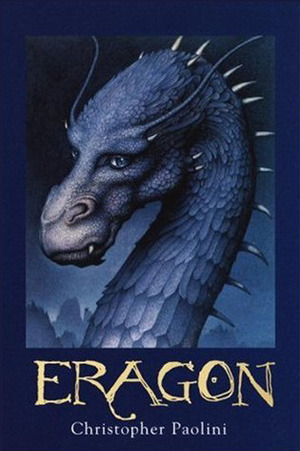 Eragon
Eragon Eldest
Eldest Brisingr
Brisingr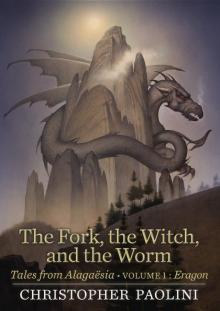 The Fork, the Witch, and the Worm
The Fork, the Witch, and the Worm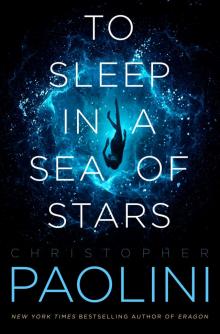 To Sleep in a Sea of Stars
To Sleep in a Sea of Stars![Eldest [en] i-2 Read online](http://i1.bookreadfree.com/i/03/19/eldest_en_i-2_preview.jpg) Eldest [en] i-2
Eldest [en] i-2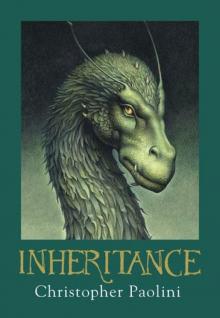 Inheritance i-4
Inheritance i-4![Brisingr [en] i-3 Read online](http://i1.bookreadfree.com/i1/03/31/brisingr_en_i-3_preview.jpg) Brisingr [en] i-3
Brisingr [en] i-3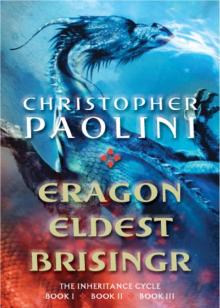 Inheritance Cycle Omnibus
Inheritance Cycle Omnibus